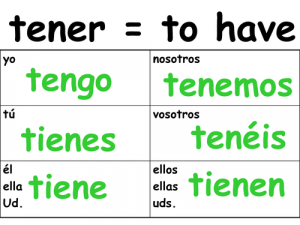Language/Spanish/Grammar/Tener
Jump to navigation
Jump to search
Rate this lesson:
The use of the verb "Tener" (to have)
Conjugation
In Spanish, the verb "tener" means "to have." It is an irregular verb, which means its conjugation does not follow the standard patterns of regular verbs. Here is a breakdown of the conjugation of "tener" in the present, past (preterite and imperfect), and future tenses in the indicative mood.
Present Tense - Presente de Indicativo
- yo tengo - I have
- tú tienes - you have (informal)
- él/ella/usted tiene - he/she/you (formal) have
- nosotros/nosotras tenemos - we have
- vosotros/vosotras tenéis - you all have (informal)
- ellos/ellas/ustedes tienen - they/you all (formal) have
Past Tense
a) Preterite Tense - Pretérito Perfecto Simple
- yo tuve - I had
- tú tuviste - you had (informal)
- él/ella/usted tuvo - he/she/you (formal) had
- nosotros/nosotras tuvimos - we had
- vosotros/vosotras tuvisteis - you all had (informal)
- ellos/ellas/ustedes tuvieron - they/you all (formal) had
b) Imperfect Tense - Pretérito Imperfecto
- yo tenía - I used to have, I had
- tú tenías - you used to have, you had (informal)
- él/ella/usted tenía - he/she/you (formal) used to have, had
- nosotros/nosotras teníamos - we used to have, we had
- vosotros/vosotras teníais - you all used to have, you all had (informal)
- ellos/ellas/ustedes tenían - they/you all (formal) used to have, had
Future Tense - Futuro Simple
- yo tendré - I will have
- tú tendrás - you will have (informal)
- él/ella/usted tendrá - he/she/you (formal) will have
- nosotros/nosotras tendremos - we will have
- vosotros/vosotras tendréis - you all will have (informal)
- ellos/ellas/ustedes tendrán - they/you all (formal) will have
Subjunctive Mood
Used for hypothetical situations, wishes, or emotions. The conjugation of "tener" in the subjunctive mood is as follows:
- yo tenga
- tú tengas
- él/ella/usted tenga
- nosotros/nosotras tengamos
- vosotros/vosotras tengáis
- ellos/ellas/ustedes tengan
Imperative Mood
Used for giving commands or requests. The conjugation of "tener" in the imperative mood varies depending on whether the command is affirmative or negative:
- Affirmative (tú): ten
- Negative (tú): no tengas
- Affirmative (usted): tenga
- Negative (usted): no tenga
- Affirmative (nosotros/nosotras): tengamos
- Negative (nosotros/nosotras): no tengamos
- Affirmative (vosotros/vosotras): tened
- Negative (vosotros/vosotras): no tengáis
- Affirmative (ustedes): tengan
- Negative (ustedes): no tengan
Use of the verb "Tener" in Spanish
Use of the verb "Tener" to express feelings or sensations
In English, we use TO BE + ADJECTIVE:
- Tengo hambre
I'm hungry
It's less common to say:
Estoy hambriento(like in English).
In Spanish we use TENER + NAME:
- Tengo frío
I'm cold
- Tengo sueño
I'm sleepy
Use of the verb "Tener" to say your age
- In English, they use "to be": I'm 22 (years old).
- In Spanish, we say "Tengo 20 (años)".
Use of the verb "Tener" to express possession
- Tengo una casa
I have a house
Use of the verb tener"Tener" to manifest obligation
- Tengo que estudiar
I have to study
Other Lessons
- Sentense Structure
- Conditional Mood
- Por vs Para
- Negation
- Prepositions
- How to conjugate in spanish
- Future Tense
- Use of verb Haber
- Be Polite
- The word that cannot be written

